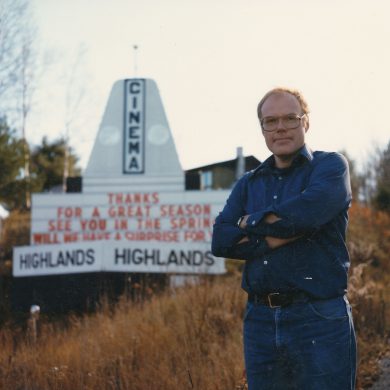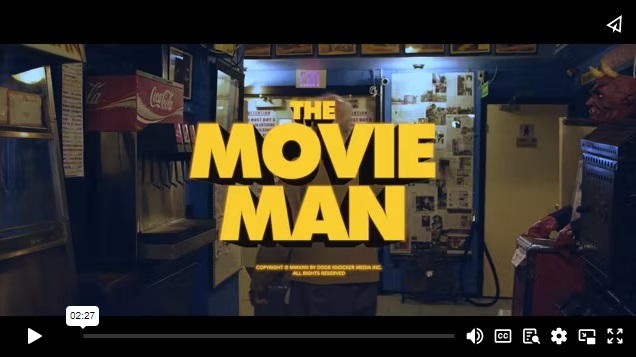Kevin Drew doesn’t mince words when discussing his love of film.
“I’m such a lover of cinema,” declares the co-founder of Toronto alt band Broken Social Scene (BSS) and owner of the Arts & Crafts record label. “All I wanted to do is be a director – and then I started out in an instrumental band to make soundtracks. A couple of guys told me to start singing and then I went off on this journey [with BSS.]”
So, it’s really no surprise that when the opportunity came to score the Matt Finlin documentary The Movie Man – which profiles Keith Stata, a Kinmount, Ontario, entrepreneur who built his own, unique, six-screen cineplex 40 years ago called Highland Cinemas, on his farm – Drew welcomed it with open arms.
And he discovered Stata is quite the character. “He adopts cats,” says Drew. “He looks after about 40 cats. So you’re watching this movie, and suddenly he starts talking about his love for cats, and how he has about 40 cats on his property. He takes in strays and lost cats, and you just think to yourself, ‘Oh my God! Who is this person?’”
Despite Kinmount’s relatively small population of 500, Stata managed to make a go of it for 40 years, supported by the nearby communities of Minden Hills, Trent Lakes, and the City of the Kawartha Lakes. Finlin’s film documents the fragile status of Stata’s business once the pandemic hits.
Drew says he initially met director Finlin when the latter invited Broken Social Scene to participate in a telethon he was arranging on behalf of Pearl Jam’s Eddie Vedder and his wife Jill, benefitting research to combat EB (epidermolysis bullosa, a group of genetic disorders that makes the skin tear, blister, and erode from even minor abrasions).
“I sort of said, ‘Why do you want us in the show?,’” Drew says with a laugh. “And he just spoke to the appeal of the band, and the idea of trying to be hopeful amongst everything that’s around you, and community, and all this… so that’s how Matt and I met.

The Movie Man: Keith Stata
“And we started talking a lot, and started to bond, and talked about both of our mothers who were unwell at the time. And we spoke of our love of cinema, and I got to know more and more about what he was doing, and what he was producing. He told me he had made this doc.”
After watching a cut of The Movie Man (which was co-executive-produced by Barenaked Ladies’ Ed Robertson), Drew was asked by Finlin to score the film, as he wasn’t happy with the original music.
“When I watched that film,” says Drew, “I felt that melancholy aspect of not only watching this man and the 30 years of his love of cinema, and creating this crazy theatre for people to come to, but I also saw what was speaking to the times of right now; how the analog world of appreciating things had depleted, and even with the [actors’ and screenwriters’] strikes that are going on out there, I just thought it was brilliant.”
He agreed to provide the score, and called in Do Make Say Think‘sOhad Benchetrit to lend him a helping hand. “He’s a producer I’ve worked with throughout my career, and I told him I’m doing a favour for a friend of mine, but because it’s a really beautiful film,” says Drew. “I wanted to use harmoniums and pianos – just make it very analog, with, of course, the drones that everyone can rely on. I’ve been droning since I was eight: ambient music, and just texture and tones, have been something that has been in my life since I was a little kid.
“And I’ve seen it just take off viciously in the cinema and television,” he continues. “It makes me happy, hanging on notes and spacing out is a beautiful way to display emotion. And melancholy is the simplest form of music; you know, writing sad songs is very, very easy. Writing happy, upbeat pop songs I think is extremely difficult.
“So, when Matt told me, ‘Look, I just need to tap into a little bit of the sadness around it,’ I thought ‘OK, let’s go,’” says Drew. “I sent him some stuff. He liked it. Once a director tells you that they like what you’re doing, you do more. So, I started to create more themes. It was very lovely. It was very organic and simple.”
Going from “a kids’ record” to Aging
Kevin Drew insists that his fourth solo album, the eight-song Aging (out Sept. 22, 2023, in physical format, and Nov. 3, 2023, digitally), started out as a totally different type of record before things took a twist: namely, the loss of good pals like Tragically Hip singer Gord Downie – and recently, Drew’s own mother.
“I started it out as a kids’ record,” says Drew. “But there’s always people who are ill… people that we lost… And as you get older, you find yourself starting to circle around what really matters, and [living] through the pain of watching your parents get older. My mom, unfortunately, just started to become unwell. It was a five-year process, and I lost her a month ago.”
He also said he felt very connected to Finlin and his mission. “Fortunately, it wasn’t a difficult film to score without cues,” says Drew. “Normally, it can’t be done, but there’s a way where you can say, ‘Okay, I’m looking for this theme,’ and Matt was very descriptive in how he wanted this film to go, so… I’m not saying it was easy to make music , but there was a connection that was easy to tap into to get a result for him, and he was very happy with it.”
Drew created and delivered the film’s music very quickly. “I don’t like to spend a lot of time anymore,” he says. “I think you cannot sell, or put a price on, intuition. You cannot sell, or put a price on, first instincts. And we’re at a time where you have so many chances and shots, and you can change, and add to it, and do so many things that, as an old guy, I’ve taken away from that.
“So, people who work with me on videos, soundtracks, or producing, or writing with them, they know that I want to do it quickly. I don’t like the idea of pouring in your whole life and identity into a project, because I’ve done it. I’m out of that era.”
